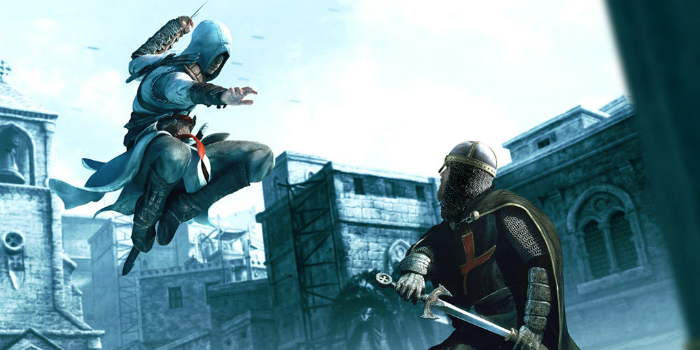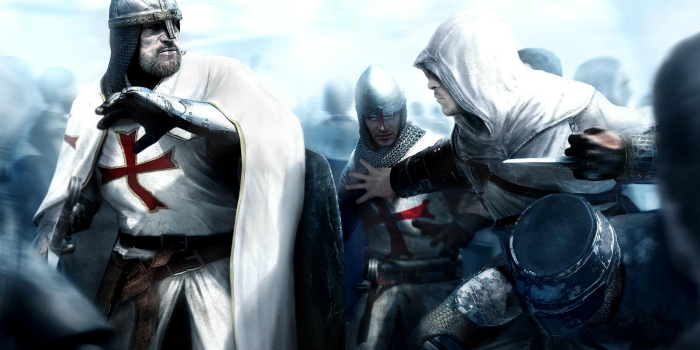The original Assassin

The story of Altair is the one that kicked off the entire franchise. This vast universe unfolded by telling his dark turn from apprentice to master, which evidently took us the furthest back in time to 1191 AD, set during the Third Crusade.
Not only was this setting the most fitting one for the general theme, but it also laid the foundation for the series as a whole, both in terms of its lore and the actual mechanics. Sequels built upon what the original Assassin’s Creed presented, and every character that followed was connected to Altair in some way, albeit in terms of ancestry or by a certain item or piece of equipment linking them together.
It’s a traditional story of a student uncovering the truth about his beliefs, causing the lore of Assassin’s Creed to take a dark, historic tone. Whatever you may think of the original game in terms of its mechanics or general structure, there’s no denying that it caused a tremor in the gaming industry that can still be felt to this day, and Altair is mostly to thank for that.
No need for bells and whistles

While modern assassins have hidden blade modifications like hook blades, concealed crossbows, or fully fledged grappling hooks, Altair became the one true Master Assassin without any of those fancy additions. Add to that the fact that Altair had but one hidden blade compared to the now-custom two bits of gear, and he’s nothing short of a prey-stalking badass.
Altair may not have been as agile and resourceful as his descendants when we got to meet him first, but damned if he didn’t make due with what he had. Every major Assassin following him was but a padded-up version of this original Master Assassin, and many of Altair’s ideas shaped the future for the Brotherhood as a whole.
Granted, Altair does use his fair share of unique weapons and gadgets. He used a hidden gun prototype, later used by Ezio Auditore and refined by Leonardo DaVinci, for example, which more or less coincides with the first ever documented use of firearms in the 13th century. There’s also the iconic Apple of Eden Altair was forced to wield, despising it for causing Al Mualim’s descend into madness.
Hide in plain sight

Fancy top hats or pirate outfits may allow you to blend in a little better, but Altair needed nothing but his traditional assassin robes to hide in plain sight. Using the masses to fade into obscurity, acting like a praying priest, or simply sitting on a bench were just some of the methods Altair used to slip by unnoticed. While most of those are still present in later games, we rely far too little on the old so that we can experiment with the new.
The original Assassin’s Creed was arguably the stealthiest of the series, encouraging you to hide among the crowd to avoid detection. Combat proved to be very tough, making a sneaky approach a necessity when it came to completing missions and furthering the story. Its stealth mechanics are quite dated compared to today’s standards, but the verticality Assassin’s Creed introduced to the genre was relatively unheard of, combining fluid free-running with a detailed open world where the streets and rooftops alike were your shadow-drenched playgrounds.
Molded by his creed

Just like everything else about Altair, his backstory wasn’t all too complicated. His introduction into the Brotherhood didn’t originate from tragedy or necessity, but he was simply born into this cult. It wasn’t until he betrayed his corrupted mentor, Al Mualim, that his story grew infinitely more complex, with his actions shaping the future of the Assassins that followed him. He even went as far as to become lovers with a sworn enemy, a Templar by the name of Maria Thorpe.
Edward Kenway’s cockiness or Jacob Frye’s nonchalant flare are written into the character and don’t change too much throughout the course of the corresponding games, but Altair’s stubborn nature and arrogance developed and were shaped by the path he took. He is by no means a likable character, mind you, but he’s rather a person who sacrificed everything to ensure a future for his Brotherhood.
Dying peacefully in his tomb at the age of 92, Altair frequently regrets some of the actions he had to undertake or the choices he was forced to make. Regardless of how he feels about his past, he wouldn’t change it in a heartbeat, knowing his connection to the modern-day Assassins as well as the First Civilization would save Earth from a terrible fate. Initially, many will see a man that is stubborn and impulsive, but those who have stuck with the series and have seen glimpses of him know how he has suffered for his people.
